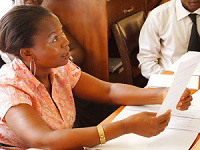May 2013
- Posting by PRAWA
- News
PRAWA under the on-going Speeding-Up Criminal Justice Project in Enugu State funded by Justice for All J4A of DFID has![]() concluded the training of 35 Court Registrars and Clerks and 4 Case Management System Officers on the skills of preparing and filling control forms and data entry documents of the Enugu State Judiciary Case Management System in Enugu recently. The training was designed, organized and delivered as part of the deliverable activities of the project “Speeding-Up Criminal Justice in Enugu State”.
concluded the training of 35 Court Registrars and Clerks and 4 Case Management System Officers on the skills of preparing and filling control forms and data entry documents of the Enugu State Judiciary Case Management System in Enugu recently. The training was designed, organized and delivered as part of the deliverable activities of the project “Speeding-Up Criminal Justice in Enugu State”.
The new Case Management System was developed to help keep easy tracks of all criminal cases from the time of inception through all the stages to finishing. The essence was to determine causes of delays experienced in the dispensation of criminal cases. This training of Court Registrars, the Court Clerks and CMS Officers on how to fill the control forms and how to enter data on the Case Management System compliments the development of the Case Management Units CMU in the criminal justice institutions in Enugu State. The participants were also trained on the witness tracking and completion of Witness Tracking Form which is to form part of the contents of every criminal case files in the system.
The training of the Court Registrars, Court Clerks and CMS Officers on the filling of the weekly Case Update Forms CUF, the Case Registration and Update Form CRAF and the Witness Tracking Forms WTF was held from the 24th – 26th of April, 2013 at the Enugu State High Court Case Management Unit. The training on the CMS related forms were conducted by the (J4A) Consultant on the Case Management System Mr. Ndubuisi Onuoha while the training on the Witness Tracking Forms was done by Chioma Emehelu Project Manager (PRAWA).
 The training guided the participant on the practical methods of entering information on the forms with the close supervisions of the trainers on how to fill the forms. They were tasked to fill the forms individually to ascertain whether or not they understood what they were taught. Thereafter the trainers introduced role plays during the sessions wherein they made the trainees play roles of either CMS Data Entry Clerks or witnesses. For those that played the role of witnesses, the participants were asked to educate them on the information contained on the witness tracking form checklist to ensure they can apply what they learnt from the training in their courts.
The training guided the participant on the practical methods of entering information on the forms with the close supervisions of the trainers on how to fill the forms. They were tasked to fill the forms individually to ascertain whether or not they understood what they were taught. Thereafter the trainers introduced role plays during the sessions wherein they made the trainees play roles of either CMS Data Entry Clerks or witnesses. For those that played the role of witnesses, the participants were asked to educate them on the information contained on the witness tracking form checklist to ensure they can apply what they learnt from the training in their courts.
Some of the identified challenges to smooth application of the learnt skills to the field operations as identified by the trainees include questions of the appropriate time to fill the witness tracking form, but from the check list at the back of the form it is understood that the appropriate time to fill the form is when a witness in a court case comes to court for the first time before the witness is called up to give evidence in the court.
The court registrars pointed out how that it will be difficult for them to achieve this because some witnesses arrive when the court is already sitting and that there is very little identifying the witnesses except when they have been called up by the court to give evidence, adding that there will be no time at that point to approach the witnesses for counsel since it would amount to wasting the time of the court.
It was however agreed by the group that a way around the challenge will be to make the Court Registrars and the Court Clerk to fill the weekly Update Court Form and return them to the CMS Officers on weekly basis. The discussion led to agreement that certain columns on the Witness Tracking Form were changed and even some added. The trainees were of the opinion that there is need for the Court Registrars to be motivated when they take on additional duties as court interpreters. This is because the Court pays for the services of external interpreter, when they are engaged.
